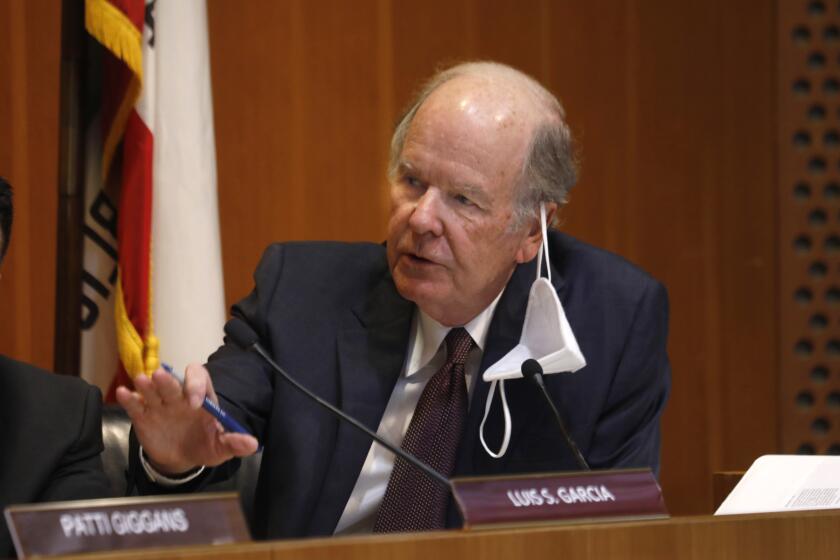City to Purchase 702-Acre Inter-Valley Ranch
- Share via
The City of Glendale this week agreed to buy the largest remaining undeveloped parcel in the city--the 702-acre Inter-Valley Ranch at the foot of the San Gabriel Mountains--for $5.2 million.
The hillside is expected to provide key access to state and federal wilderness areas in Los Angeles. The purchase also tentatively ends a legal battle over a proposal for housing developments on the site.
The Glendale City Council unanimously approved the purchase Tuesday but warned that the agreement hinges on obtaining some critical money from the state. The action coincided with the appointment Tuesday of the city’s veteran parks director to director of the state Department of Parks and Recreation.
The director of a parklands coalition said the appointment of Henry R. Agonia to the state post “bodes extremely well” for the city to acquire the funds to purchase the property. However, city officials said the purchase agreement was not connected to Agonia’s appointment, which was not announced until after the council approved the sale.
Proposed subdivision of the Inter-Valley Ranch, in the northernmost part of Glendale overlooking La Crescenta Valley, has been marked by controversy for almost three decades. The ranch spans Dunsmore and Cooks canyons north of Foothill Boulevard and is the site of a vintage winery, now used as a horse stable, that the city has declared historically significant.
The property borders on the Rim of the Valley Trail, which stretches from the Santa Monica Mountains through the San Gabriels and ties into a state and national trail system for hiking and horseback riding.
Public acquisition of the Inter-Valley Ranch “adds a much-needed dimension to the entire park system,” said Joseph Edmiston, executive director of the Santa Monica Mountains Conservancy, the private parklands coalition dedicated to preserving open space. “The property not only provides access to the Verdugos, but access to the whole national forest trail system. That’s critical access in an area where development has been built right up to the forest.”
The purchase agreement tentatively settles a suit filed in 1985 by landowners, which challenged the right of cities to block development in order to preserve open space.
The suit sought more than $100 million in damages from the city, which rejected the most recent development plan, a 282-unit housing subdivision proposed in 1979. Earlier development proposals ranged from a trailer park to more than 1,400 housing units.
The sale agreement requires the city to immediately pay $3.2 million to a group of landowners and Uni-Cal Financial Corp., the developer, with the balance to be paid over the next three years, according to Scott H. Howard, senior assistant city attorney. Settlement of the landowners’ suit is contingent on the sale.
The city last year set aside $2 million in capital improvement funds toward the purchase but must come up with another $1.2 million for the down payment. City officials said they are unsure where they will get the added funds. They are counting on obtaining state assistance, Howard said.
In a separate development, Gov. George Deukmejian on Tuesday appointed Agonia to the $72,500-a-year state post. The state director could be instrumental in allocating state or federal grant money for purchase of open space, state officials said.
Agonia, 44, of La Crescenta has worked for the Glendale parks deparment since he graduated from California Polytechnic University, Pomona in 1970. He has served as parks director for the city since 1977 and spearheaded the drive to acquire Inter-Valley Ranch and other open space. Glendale has purchased about 2,500 acres for preservation in the Verdugo Mountains and San Rafael Hills.
The city last year agreed to match state funds to acquire the ranch, then valued at about $4 million. Acquisition of the ranch was given a high priority by the conservancy, which acts as a state intermediary in channeling funds to acquire open space.
However, Glendale’s request for a $2-million appropriation from the state budget was vetoed in August by Deukmejian. The funds were to have come from a state bond act but the bonds were never approved by the Legislature, Edmiston said. Without available funds, Deukmejian said, the request was “premature.”
Meantime, the price tag on the ranch property increased to $5.2 million because of growing property values, Howard said. The higher price has been approved by the city’s appraiser, he added.
Attorneys representing property owners said last year that they were willing to accept $4.6 million for the property. Provisions of the settlement prohibit attorneys from disclosing further details of the price negotiations. Howard was willing to say that each of the parties will pay its own legal costs in the suit.
Glendale officials said the city will seek a share of federal funds allocated through the state’s Land and Water Conservation Fund. However, Edmiston said, he is uncertain whether the fund contains enough money to meet the city’s shortfall for the down payment. Glendale officials said they are also looking at the city’s budget to determine if money can be temporarily shifted from other accounts to meet the down payment.
Howard said the settlement was reached after a month of negotiations among city officials, landowners and developers under the direction of the U.S. District Court.
William W. Bliss of Sedona, Ariz., a trustee for property owners who filed the lawsuit, said the settlement “is beneficial to the city and to everybody concerned.”
A real estate investor who has held part ownership of the property since 1961, Bliss said when he filed the suit that he was “seeking revenge” from the city and its residents for repeatedly preventing him from developing the property.
More to Read
Sign up for Essential California
The most important California stories and recommendations in your inbox every morning.
You may occasionally receive promotional content from the Los Angeles Times.













